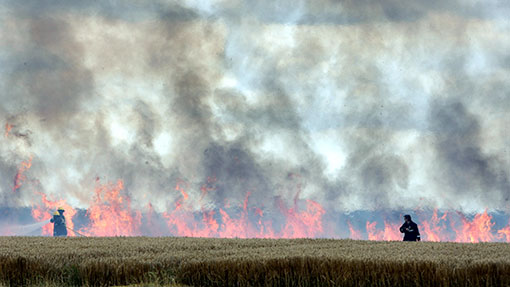Insurers warn of higher farm fire risk at harvest

Farmers need to take more precautions against fire risk during haymaking and harvesting.
South West insurer Cornish Mutual has had 19 farm fire claims since 1 June, with hot machinery and dry conditions combining to pose an especially high risk, it says.
Its tips to reduce fire risk include:
- Cleaning machinery regularly, ensuring belly pans and spaces around motors are free from oil, dust, grease, straw and hay
- Servicing machinery regularly, making sure it is free from mechanical defects that could start fires
- Storing petrol, diesel, fuels and chemicals in clearly labelled approved containers. They should be stored separately and away from other farm buildings.
- Checking machinery and other storage areas for ignition sources such as electrics, machinery and smoking, keeping areas clean of rubbish, oily rags, firewood and other fuel sources.
Taking all the right precautions, especially making sure that all hay, straw and dust is blown off machinery at the end of the day, is important, said Daniel Philp of Lancare agricultural contractors, based in Looe, Cornwall.
Most of the farm building fires attended by Cornwall Fire and Rescue Service involve the loss of large amounts of stock, straw, hay, farm machinery, chemicals and even livestock.
Safety advice produced by the service jointly with Cornish Mutual points out that a fire risk assessment for farm buildings is a legal requirement.
This involves identifying hazards, evaluating risks, and preparing an emergency plan and is available at online.
See also: Better Business: Pre-harvest checks
While fire claims numbers have remained fairly steady over the past five years, insurance loss adjuster Agrical generally deals with between 130 and 170 fire-releated claims every summer.
The majority of these during the harvest period involved stacks of hay and straw bales, said Peter Thompson, divisional director at Agrical. These losses were significant, often involving damage to storage facilities as well.
While the majority of these fires were due to arson, many also related to farming practices, such as hay being baled before it is properly dry and then stored in confined places, giving it the potential to spontaneously combust.
“We see such claims on a regular basis, particularly in poor seasons where farmers are under pressure from the weather and bale hay that is not as dry as it should be. We also see a lot of fires involving grain dryers, combine harvesters and balers, often relating to poor servicing, lack of lubrication, accumulation of chaff and so on.”
See also: Top tips to get renewable energy insurance right
Farmers should be aware of that more insurers were imposing a stack limit, of typically £25,000 in value in any one stack, as part of their policy terms and conditions, said Mr Thompson.
“We have on occasion come across stacks of bales which are valued higher than the limit and this can lead to significant uninsured losses for the farmer. We would also recommend that farmers think carefully about where they put stacks of bales. Often those that are placed in more isolated locations are more vulnerable to arson attacks.”
